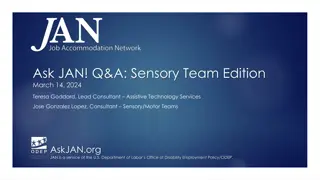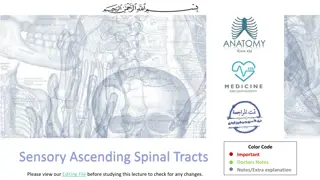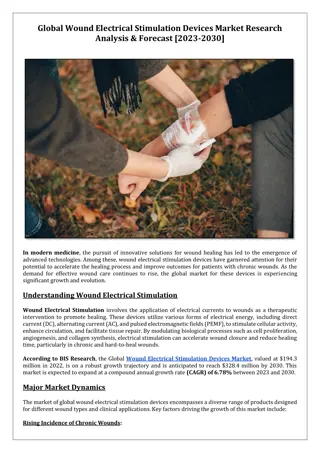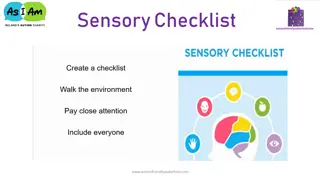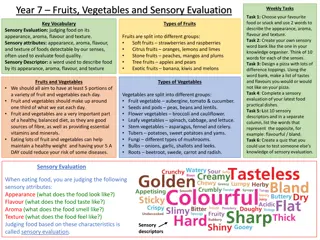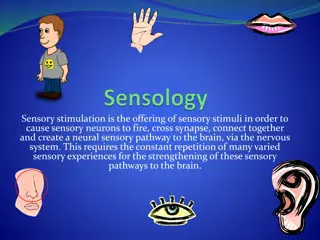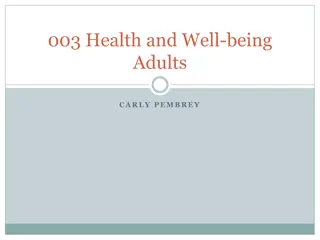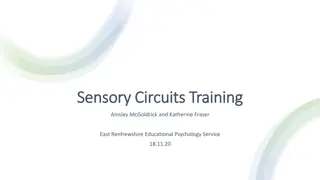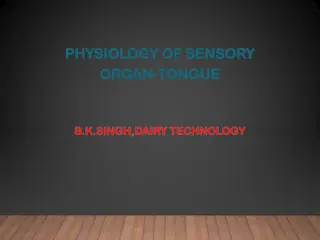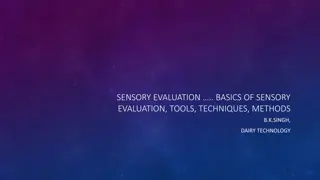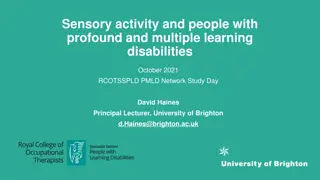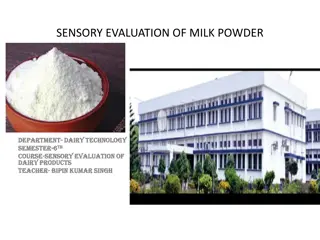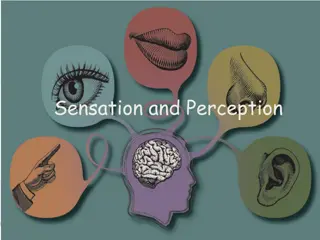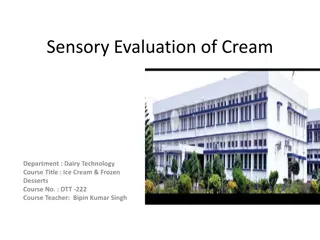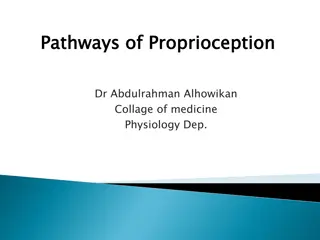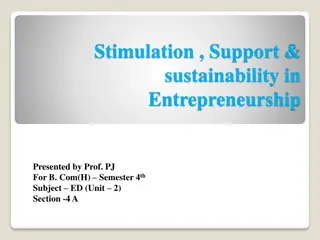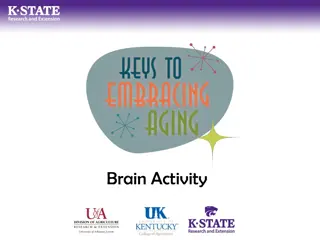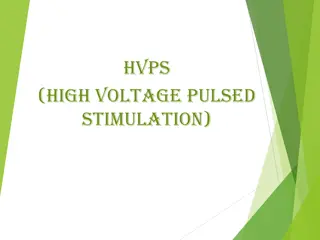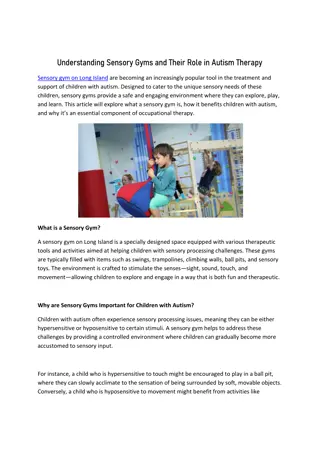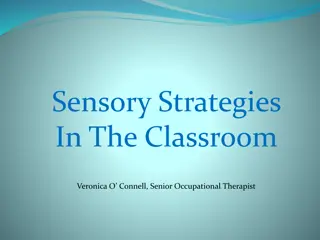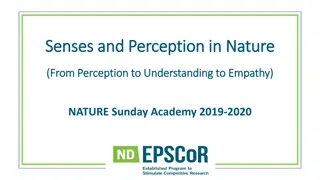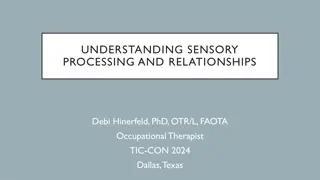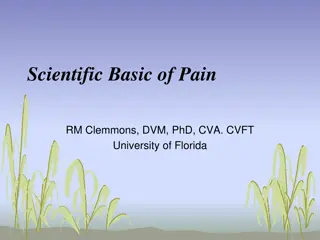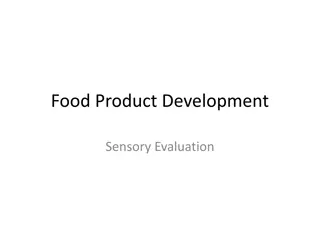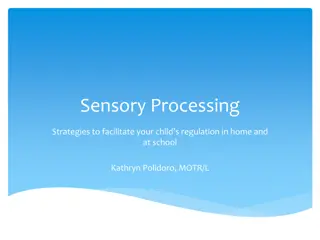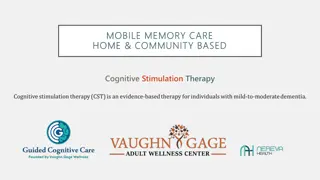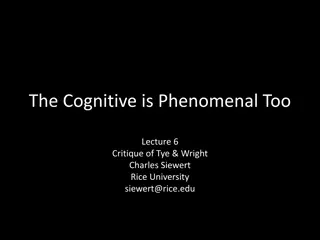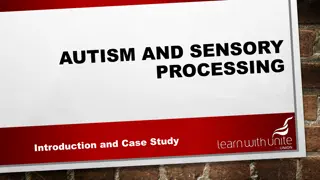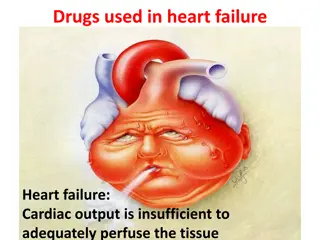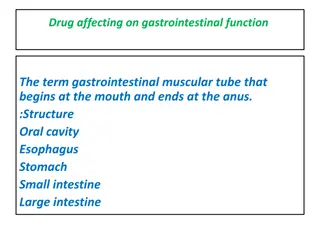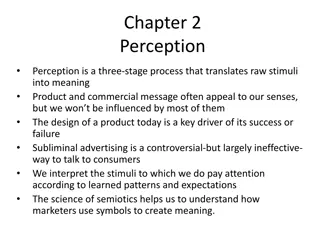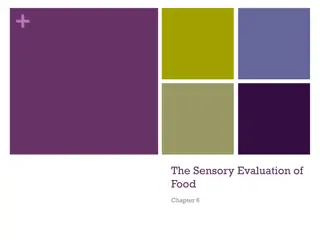Sensory Team Q&A Session Overview
Training overview for the Ask JAN Q&A: Sensory Team Edition on March 14, 2024. Learn about accommodation topics related to sensory impairments, respiratory conditions, digital accessibility, and more. Get insights from JAN consultants and engage in interactive discussions. Discover how JAN's Sensory
2 views • 30 slides
Sensory Ascending Spinal Tracts
Learn about sensory ascending spinal tracts, their classification, functions, and pathways. Explore how information is carried to the brain at conscious and subconscious levels through different types of sensations. Gain insights into the organization of white matter tracts and their importance in s
4 views • 22 slides
Global Wound Electrical Stimulation Devices Market Research Analysis & Forecast
According to BIS Research, the Global Wound Electrical Stimulation Devices Market, valued at $194.3 million in 2022, is on a robust growth trajectory and is anticipated to reach $328.4 million by 2030. This market is expected to expand at a compound annual growth rate (CAGR) of 6.78% between 2023 an
9 views • 3 slides
Enhancing Sensory Experience for Autism-Friendly Communities
Discover sensory checklists, accommodations, maps, and sensory boxes designed to create inclusive spaces for individuals with autism on autismfriendlywaterford.com. Experience a range of resources to optimize comfort and accessibility across public and employment spaces.
0 views • 5 slides
Exploring Fruits, Vegetables, and Sensory Evaluation in Food Science
Delve into the world of fruits, vegetables, and sensory evaluation through engaging tasks like describing favorite foods, creating sensory word banks, designing unique pizzas, and conducting sensory evaluations. Learn about different types of fruits and vegetables, their importance in a balanced die
0 views • 4 slides
Sensory Stimulation for Neural Pathway Development
Sensory stimulation involves offering sensory stimuli to activate sensory neurons, cross synapses, and create neural pathways to the brain. Consistent exposure to varied sensory experiences is crucial for strengthening these pathways. The provided content includes activities such as introducing lear
0 views • 9 slides
Understanding Sensory Loss in Adults: Causes, Signs, and Impact
Sensory loss, including sight and hearing impairment, can affect individuals of any age. Causes range from trauma to genetic conditions, with indicators like changes in behavior or difficulty with communication. This loss can significantly impact daily life, communication, and social interactions. R
0 views • 13 slides
Understanding Sensory Circuits Training and Integration
Explore the importance of sensory circuits training, sensory integration needs, and the impact on sensory processing. Learn about the various sensory systems, components of sensory integration, and the challenges individuals may face with sensory processing difficulties. Discover strategies to suppo
0 views • 24 slides
Understanding the Physiology of the Sensory Organ - Tongue by B.K. Singh
Taste perception on the tongue is a vital sensory function involving sweet, sour, salty, and bitter sensations. The tongue, with its muscular movements and taste buds, plays a crucial role in mastication, swallowing, and food enjoyment. Different types of papillae on the tongue are responsible for t
4 views • 33 slides
Sensory Evaluation and Grading of Milk in Dairy Technology
Judging and grading of milk in dairy technology involves sensory evaluation based on taste, smell, touch, and sound. Milk is classified into grades (Grade I, II, III) based on quality attributes such as off-flavors, colors, and foreign materials. Sensory evaluation utilizes all 5 senses to gather in
0 views • 13 slides
Understanding Sensory Evaluation in Food Science
Sensory evaluation in food science involves analyzing human responses to the characteristics of food and beverages using the senses of sight, smell, taste, touch, and hearing. This scientific discipline aims to elicit, measure, analyze, and interpret reactions to the sensory attributes of food produ
0 views • 32 slides
Understanding Sensory Activity for People with Profound Learning Disabilities
Exploring the importance of sensory activity for individuals with profound learning disabilities, this session delves into meaningful engagement through sensory experiences. Key findings from a 2018 survey are shared, highlighting the need for resource development and sharing. The focus is on sensor
0 views • 26 slides
Sensory Evaluation of Milk Powder in Dairy Technology: Flavors and Characteristics
Sensory evaluation is crucial for determining the quality and shelf life of milk powder products. This study focuses on sensory analysis methods to identify flavors and physical characteristics of whole milk powder, skim milk powder, and malted milk. It discusses common flavor defects, texture varia
2 views • 12 slides
Understanding Sensation and Perception in Psychology
Sensation and perception play crucial roles in how we experience the world around us. Sensation involves the detection of stimuli through sensory organs, while perception involves the interpretation of these stimuli in the brain. The process includes transduction, where physical energy is converted
1 views • 19 slides
Sensory Evaluation of Cream in Dairy Technology: Ice Cream & Frozen Desserts
Cream is a crucial component of dairy products, varying in fat content and processing methods. This course covers the sensory evaluation of different types of cream, including table cream, whipping cream, plastic cream, frozen cream, and more. Students learn to assess cream quality based on flavor,
0 views • 10 slides
Understanding Proprioception Pathways in Physiology
This information delves into the intricate pathways of proprioception, focusing on the somatotopic organization of ascending sensory pathways, types of receptors involved, dorsal column tracts like gracilus and cuneatus, spinocerebellar tracts, and the role of the cerebral cortex in perceiving propr
0 views • 22 slides
Strategies for Entrepreneurial Stimulation, Support, and Sustainability in Today's Business Landscape
In the competitive global business environment, entrepreneurship is crucial for sustainable economic development. To foster a conducive entrepreneurial ecosystem, providing stimulation for innovative ideas, support for entrepreneurs, and ensuring long-term sustainability are essential. Various appro
0 views • 13 slides
Understanding Sensation and Perception in Psychology
Explore the fascinating world of sensation and perception in psychology, where we delve into how our senses interact with stimuli to create our conscious experiences. Sensation involves the activation of our sense organs by external stimuli, while perception refers to the interpretation of those sti
3 views • 19 slides
Optimal Aging: Influencing Your Health and Well-being
Establishing healthy lifestyle behaviors throughout your life is essential for optimal aging. This involves practicing safety, maintaining a positive attitude, knowing your health numbers, eating smart, managing stress, staying physically active, addressing financial affairs, engaging in brain activ
0 views • 17 slides
Understanding Sensation and Perception in Psychology
Sensation and perception play crucial roles in how we interpret the world around us. Sensation is the process by which stimuli trigger our sensory receptors, while perception involves organizing and interpreting sensory information. This chapter delves into thresholds, sensory differences, Weber's L
0 views • 52 slides
Overview of High Voltage Pulsed Stimulation (HVPS) in Medical Applications
High Voltage Pulsed Stimulation (HVPS) is a versatile form of electrical stimulation used in various medical applications such as wound healing, muscle reduction, nerve stimulation, and pain control. Originally developed in 1945, HVPS delivers monophasic current with unique features like fixed durat
0 views • 34 slides
Understanding Sensory Gym on Long Island and Their Role in Autism Therapy
Sensory gym on Long Island are becoming an increasingly popular tool in the treatment and support of children with autism. Designed to cater to the unique sensory needs of these children, sensory gyms provide a safe and engaging environment where the
4 views • 3 slides
Understanding Strength-Duration Curve in Neuromuscular Stimulation
The strength-duration curve depicts the relationship between electrical stimulus intensity and time required for minimal muscle contraction. It helps assess nerve damage in lower motor neuron lesions. Various types of curves exist based on innervation status, such as normal innervation, complete den
0 views • 15 slides
Cognitive Stimulation Therapy in Post-Acute Care: A Pilot Study
Cognitive Stimulation Therapy (CST) is an evidence-based group intervention designed for individuals with mild to moderate cognitive impairment. It aims to enhance cognitive functioning through various activities such as executive functioning tasks, multi-sensory stimulation, and reminiscence work.
0 views • 9 slides
Effective Strategies for Children with Developmental Language Disorder, Sensory Processing Disorder, and Fine Motor Delays
Children with Developmental Language Disorder (DLD), Sensory Processing Disorder (SPD), and Fine Motor Delays often have accompanying sensory and fine motor deficits. Research indicates that addressing sensory processing deficits can significantly benefit children with DLD, ADHD, autism, and other d
0 views • 61 slides
Practical Strategies for Sensory-Friendly Everyday Activities
Discover practical tips for making daily tasks like tooth brushing and hair brushing sensory-friendly. Learn how to incorporate sensory considerations such as visual, proprioceptive, auditory, smell, taste, and tactile experiences into these activities to promote calmness and comfort.
0 views • 10 slides
Understanding Sensory Strategies in the Classroom
Explore sensory modulation and its impact on everyday activities. Gain knowledge of sensory systems, levels of alertness, and practical strategies for regulating sensory input in educational settings. Discover the hidden senses, cognitive strategies, and techniques to maintain the Just Right State f
0 views • 37 slides
Understanding the Nervous System and Sensory Neurons
The nervous system plays a crucial role in connecting the central nervous system (CNS) to limbs and organs through the peripheral nervous system (PNS). It consists of sensory neurons that transmit impulses from sensory receptors to the CNS, allowing us to perceive and respond to various stimuli. The
0 views • 23 slides
Understanding Sensory Perception in Nature
Sensory perception in nature explores the diverse ways organisms detect stimuli, encompassing traditional senses like sight and touch, as well as lesser-known senses such as thermoception and proprioception. Other organisms, including animals and plants, exhibit unique sensory abilities that aid in
0 views • 14 slides
Understanding Sensory Processing and Relationships: Exploring Individual Differences
Explore the intricate connections between sensory processing and behavioral responses, delving into how individual variations in sensory patterns can impact relationships, engagement, and daily routines. Gain insights into the significance of sensory experiences in nurturing brain function, and lear
0 views • 29 slides
Understanding the Science of Pain and Neural Integration
Pain is a complex sensory and emotional experience linked to tissue damage. It serves as a warning, aids learning, and triggers responses like rest. Key terms include noxious stimuli, nociceptors, pain threshold, and pain tolerance. Neural pathways transmit sensory and motor information, involving a
0 views • 80 slides
Understanding Sensory Evaluation in Food Product Development
Sensory evaluation in food product development involves measuring, analyzing, and interpreting how food characteristics are perceived by the senses. This process helps in understanding organoleptic properties, conducting different types of sensory tests such as discrimination and descriptive tests,
0 views • 35 slides
Understanding Sensory Processing in Children: Strategies for Home and School
Sensory processing plays a crucial role in how individuals respond to stimuli. When not developed properly, it can lead to various challenges affecting learning, behavior, and social engagement. This article explores sensory processing strategies to help children regulate their responses at home and
0 views • 19 slides
Cognitive Stimulation Therapy: Enhancing Brain Health in Dementia Care
Cognitive Stimulation Therapy (CST) is an evidence-based intervention for individuals with mild to moderate dementia. This therapy involves themed activities and interactive sessions aimed at stimulating brain function, creating new neural pathways, and slowing down the rate of cognitive decline. CS
0 views • 10 slides
Exploring Phenomenal Consciousness: Reducibility, Variation, and Cognitive Phenomenology
Delve into the rich realm of phenomenal consciousness, dissecting the interplay between sensory and conceptual elements. Contemplate the essence of cognitive activity, sensory features, and the potential inclusion of non-sensory aspects within consciousness. As you ponder reducibility, variation, an
0 views • 28 slides
Understanding Sensory Overload: A Day in the Life of Logan with Sensory Processing Disorder
Explore Logan's daily experiences as a 9-year-old boy with sensory processing disorder, delving into how various sensory stimuli impact his routines. From waking up to challenges with food textures, this case study sheds light on the complexities of sensory overload in individuals like Logan.
0 views • 36 slides
Therapeutic Strategies in Heart Failure Management
Heart failure is a serious condition characterized by inadequate cardiac output. Compensatory responses include sympathetic nervous system activation, renin-angiotensin-aldosterone system stimulation, and natriuretic peptide release. Pharmacologic therapies target salt and water retention, afterload
0 views • 25 slides
Understanding Gastrointestinal Function and Its Regulation by Drugs
The gastrointestinal tract, a muscular tube from the mouth to the anus, is influenced by drugs affecting its function. Structures vary in different animals, with control by the autonomic nervous system branches. Parasympathetic stimulation increases motility, while sympathetic stimulation decreases
0 views • 36 slides
Understanding the Three-Stage Process of Perception
Perception is a complex three-stage process that involves translating raw stimuli into meaning. This process includes sensation, where sensory receptors respond to stimuli, and perception, where sensations are organized and interpreted. Marketers leverage sensory cues such as colors, sounds, and odo
0 views • 8 slides
Understanding Sensory Evaluation: Influences on Food Choices and Evaluation Techniques
Explore the sensory evaluation of food in Chapter 6, focusing on factors influencing food choices such as culture, emotions, and health concerns. Learn about sensory characteristics affecting preferences, taste perception, and the scientific approach to evaluating food through sight, smell, taste, t
0 views • 11 slides
